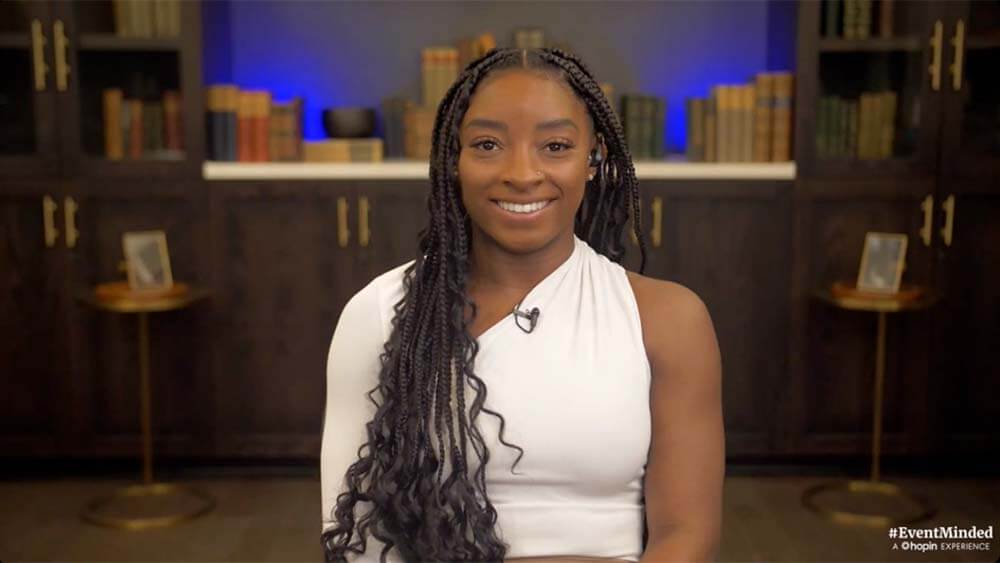
Putting her own wellbeing ahead of the expectations of others at the Tokyo Olympics was one of toughest decisions she had ever had to make, Olympic gold medal-winning gymnast Simone Biles said during EventMinded, a digital mental health summit.
Event planning already was on the list of the five most-stressful occupations before the pandemic, Julius Solaris pointed out during EventMinded, a complimentary digital mental health summit for event professionals on Oct. 12. Now, “we’re probably in the top three,” said Solaris, vice president of marketing strategy for Hopin, who hosted the event on the company’s digital events management platform.
This “new normal is incredibly challenging,” said Lauren Sommers, Hopin’s vice president of corporate marketing, who served as Solaris’ co-host. “It has pushed many of us in ways we never thought it would — even to our breaking point at times.” In addition to requiring that events professionals learn and adopt new ways of organizing events, the pandemic brought waves of anxiety, grief, isolation, and trauma as lives, jobs, and a sense of normalcy were lost in 2020 and 2021, organizers and mental-health experts said during the approximately 90-minute-long event.
Almost two years into the pandemic, we’re still dealing with uncertainty. “We’re not out of it yet,” said Rachel Riggs, wellbeing leader at Maritz Events, who joined speakers including organizational psychologist Adam Grant and gymnast Simone Biles, to talk about ways to support event professionals’ mental health and how they have managed their own amid difficult circumstances. “Left field seems to be where we sit — it is a difficult position to be in … but you should know we are not alone,” Riggs said. “The world is struggling.”
The summit was inspired by the high levels of stress and burnout reported by event professionals on social-media polls, Solaris said. The two biggest factors that predict job stress and burnout are high demands and low control, said Grant, a professor at the Wharton School of the University of Pennsylvania and the author of five best-selling books. The events industry “is full of both extreme pressure and in many cases, complete unpredictability,” Grant said. “And then, let’s add COVID to the mix. It’s extremely challenging.”
Grant has written about how the pandemic has brought on the sense of what he called “languishing” — it’s not depression or burnout, he said, but a joyless, aimless feeling.
One way to deal with it is to name it, Grant said. “If you are to put words to your emotion, you can begin to get some distance from it and gain some control over it,” he said. It can also help to then think about other times in your past that you might have felt the same way and how you handled it then, he said.
In an interview with gymnast Simone Biles, who earned 32 Olympic and World Championship medals, the athlete shared her strategies for navigating stress — including her experience at the Summer Olympic Games in Tokyo last summer, when she withdrew from some competitions, citing mental-health issues. Putting her own wellbeing ahead of the expectations of others was one of toughest decisions she had ever had to make, but ultimately was one of the bravest things she has ever done, Biles said. She had expected to feel embarrassed when she walked through the Olympic Village after withdrawing, she said, but instead received an outpouring of love and support from other athletes. “I realized I was more than gold medals,” Biles said. “Sometimes you just need to ask for help. It’s okay to not be okay and to go through some ups and downs.” Biles went on to win a bronze medal at the Olympics.
EventMinded was created to address event professionals’ mental health as a result of the pandemic, but it also illustrated how much the past nearly two years has changed how digital events are produced. The event didn’t mimic the live-event format, but presented segments of shorter, varied lengths — the longest was 25 minutes — and mixed interview, roundtable, and single-speaker formats. Most striking was the three-minute video that introduced the event and featured vignettes of event professionals who spoke on camera in a studio about the challenges that the pandemic had brought to their work and personal lives. The speakers were then handed iPads, and viewers could watch their reactions as they heard from colleagues who shared how they had been inspired by the way they had led their teams over the last 20 months and the impact they have had on them.
The video gave her chills, Sommers said. “We’re still navigating this as an industry and trying to find balance together. In a way, planning this event was cathartic — and for the first time, I can say today: ‘I am okay with not being okay.’”
EventMinded, which is free to attend, is available on demand at hopin.com/eventminded-on-demand.
Barbara Palmer is deputy editor at Convene.
